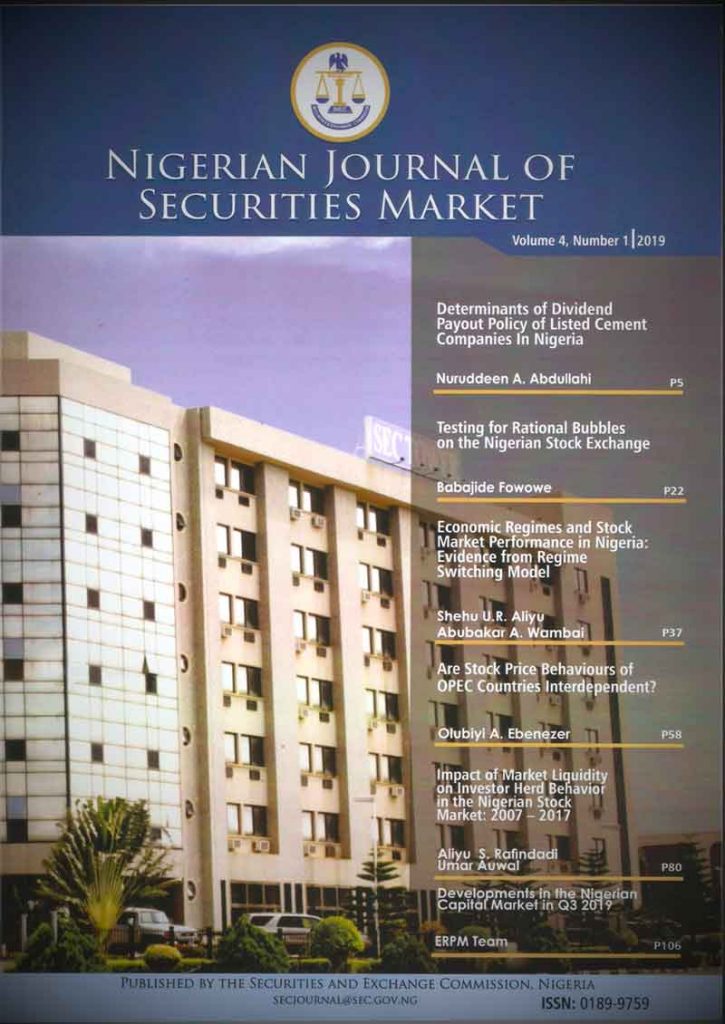
Determinants of Dividend Payout Policy of Listed Cement Companies in Nigeria – Nuruddeen Abba Abdullahi
| This study examines the determinants of dividend payout policy of cement companies listed on the Nigerian Stock Exchange. It explores the impact of some internal factors in form of financial ratios on the dividend payout ratio or policy of the companies. These financial ratios are profitability, liquidity, leverage, firm size, growth, firm risk and previous year’s dividend. Data for the study was extracted from the audited reports and accounts of the cement companies listed on the Nigerian Stock Exchange over a 10-year period (2007 to 2016). A panel data framework was constructed from the secondary data of the cement companies by using Ordinary Least Squares model to estimate the regression equation. The results show that profitability, size, risk and previous year’s dividend have positive relationship with dividend payout, but do not exert a significant influence on the magnitude of dividend payments. Whereas liquidity, growth and leverage have inverse and weak linear relationship with dividend payout ratio. Notwithstanding these results, the study did not find conclusive evidence to suggest that the seven identified internal factors or financial ratios are determinants of dividend payout ratio, which proxied for dividend policy of cement companies listed on the Nigerian Stock Exchange during 2007 – 2016. |
Testing for Rational Bubbles on the Nigerian Stock Exchange – Babajide Fowowe
The Nigerian Stock Exchange (NSE) has experienced considerable growth over the past two decades. This growth has been accompanied by spectacular increases and decreases in prices, implying substantial volatility. Such behaviour has been characterized as bubbles. It has become important to study the existence of bubbles, from both the perspectives of policy makers and investors. This study conducts an empirical investigation of the presence of bubbles in Nigeria’s stock market. We employed data for 78 firms that had data on stock prices and dividends over the period 1990 to 2016. The results of both Engle-Granger and Johansen cointegration tests showed that a long-run relationship exists between the share price index and dividends of selected companies on the stock exchange. Based on the dividend valuation model, it can be said that the market values (MV) of these companies have not deviated from their intrinsic values (IV) over the study period. This result implies that there is no evidence that bubbles exist on the Nigerian Stock Exchange. It further implies that companies seeking to raise external funding can do so from the stock market, as there is some stability in the behavior of the stock market. For regulators, they can continue to work hard to monitor the stock market and institute policies to try to avoid the occurrence of bubbles. This will ensure prevention of the adverse effects of bubbles on the economy.
Economic regimes and stock market performance in Nigeria: Evidence from regime switching model – Shehu Usman Rano Aliyu and Abubakar Aminu Wambai
| The paper analyzes volatility spillover between exchange rate and stock market in “turbulent” and “calm”, otherwise, “bull” and “bear” regimes in the Nigerian stock market from 4th January, 2010 to 30th June, 2017 using a regime heteroskedastic Markov switching model in line with Kim (1993). The approach allows regime shift in both mean and variance of a series where failure to allow for regime shift leads to an overstatement of persistence of the variance, (Lamoureuex & Lastrapes, 1990). Results from preliminary investigations reveal that both stock returns and exchange rate series exhibit non-normal distribution, presence of unit root and ARCH effects. Further, evidence of two regimes – bear and bull markets – was established with higher persistence, that is, high transition probabilities in the bear as against the bull market at 0.9455 and 0.8686, respectively. However, duration of stay in the regimes is higher in the bull market (regime 2) than in the bear market (regime 1) at 5958.12 days and 18.406 days, respectively. Moreover, analysis of volatility spillover between exchange rate and stock returns reveals that returns increases due to appreciation in the exchange rate in the bear market and diminishes in response to exchange rate depreciation in the bull market. Thus, adverse economic conditions leading to exchange rate volatility diminishes stock market returns by increasing investor risk perception, especially in the bull market. |
Are Stock Price Behaviours OF OPEC Countries Interdependent? – Ebenezer Olubiyi
This paper explores the dependence of stock markets among selected OPEC members. It investigates the risk-return tradeoff and linear correlation among the stock returns. Then it explores the dependence and volatility spillover effect of the Nigerian stock market and other OPEC members. Utilizing the DCC(1,1)-GARCH(1,1) with monthly stock price indices of selected OPEC countries between January, 2005 to March, 2018, we observe that risk-return tradeoff did not hold for some country pairs. Strong correlation occurred between some pairs of countries’ monthly annual stock returns. The stock market dependence of OPEC is time-varying and it is the case that a unidirectional dependence of Nigeria stock market on other OPEC members exists, except in Saudi Arabia where bidirectional dependence was observed. When innovations arising from any OPEC members in our study is positive (encouraging), the stock returns of Nigeria will improve. However, this positive spillover exists from all the countries except in Kuwait. Based on these results, it is recommended that Nigeria investors can purchase the stock of some OPEC countries except Saudi Arabia during the period of downturn in Nigeria. Also, the concerned authorizes such as the Securities and Exchange Commission, Nigeria Stock Exchange and the Federal Government should ensure that credible policies that will positively affect the stock market should be of highest priority.
Impact of Market Liquidity on Investor Herd Behavior in the Nigerian Stock Market: 2007 – 2017 – Aliyu Rafindadi Sanusi and Auwal Umar
This paper studies the nature and extent of investor herding, as well as the role of asset liquidity in herd formation in the Nigerian Stock Market. Using daily data for the period 2007-2017, the paper applies the market returns dispersion approach on 29 listed stocks across six sectors (agricultural, banking, building materials, conglomerate, insurance, and petroleum marketing sectors) traded on the Nigerian Stock Exchange (NSE) to detect the presence of investor herding behaviour. Bivariate vector autoregressive (VAR) model, and a pairwise Granger causality tests were employed to analyze the relationship between herding and asset liquidity. Results show significant evidence of investor herding behaviour in 12 out of the 29 assets spread across the six sectors, and significant evidence of adverse herding in eight other assets. Asset liquidity was found to exert a significant impact on herd formation. In general, investors were found to herd more under the condition of high and medium liquidity, in line with previous findings. Results of variance decomposition analysis indicate that the variance of the average equity market liquidity is affected by return clustering. This effect is most pronounced in petroleum marketing sector. Given the potential adverse effects of herding, especially in bubble formation, regulators could reduce the incidence of irrational herd formation by improving the flow, and reducing the cost, of information in the market.
